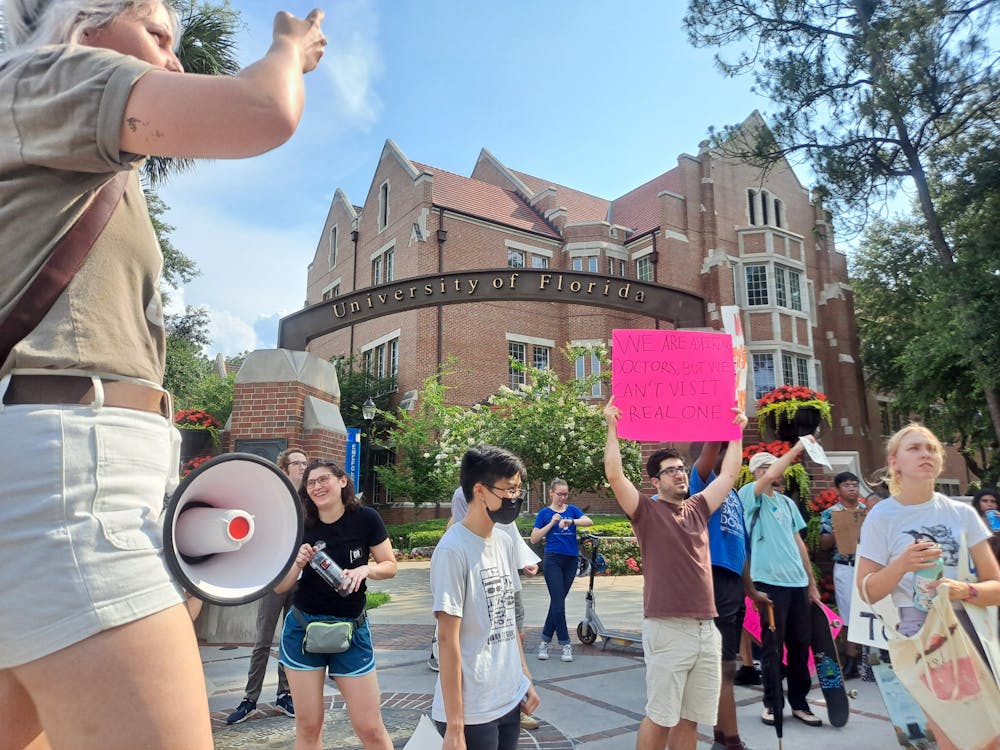UF offered graduate assistants their first wage increase in 5 years. It was less than a $1,500 raise.
UF’s offer came after a seven-month bargaining period, which included two extensions. The offers give graduate assistants a raise of about $100 per month — those with 12-month contracts will see a raise from $21,333 to $22,753 and those with 9-month contracts will see a raise from $16,000 to $17,000. The graduate assistants’ labor union said the offer was unacceptable.
Gainesville has seen inflation since graduate students’ last pay raise in 2017, said Bryn Taylor, a 25-year-old rehabilitation science graduate student and GAU’s incoming co-president. National inflation, according to the U.S. Bureau of Labor Statistics, has risen to 8.3% in 2022.
UF’s offer, Taylor said, doesn’t account for this increase.
In a survey conducted by UF GAU, 72% of responding graduate students said they were unable to cover all living expenses. Taylor said many graduate students have families who cannot be supported by the current or proposed wages, and international students are not permitted work visas to find employment off-campus.
She said UF has ignored quantitative data on what its graduate assistants should be paid. Anything below $25,000, she said, is effectively a paycut.
“It’s pretty impossible to live on either $17,000 or $22,753 in Gainesville right now,” Taylor said.
About 50 people marched from the Reitz Union to Tigert Hall Tuesday in protest of the wage proposal. Flyers, bikes and skateboards in hand, they chanted “Underworked, underpaid, top five school, top five pay.” GAU members also protested in April when UF asked for a second three-month bargaining extension.
Jennifer Perez, a first-year materials science graduate student, joined the march after it passed through the Reitz.
“UF is a top five school,” Perez said, “and it’s embarrassing to see this.”
Nearing Tigert Hall on the sidewalk alongside SW 13th Street, the crowd chanted “One, two, three, four, no one should be working poor. Five, six, seven, eight, we’re paid lowest in the state.”
Antonios Kyriazis, a 23-year-old physics PhD student, said his work as a graduate instructor and researcher adds up to more than the 20 hours per week as outlined by GAU's Collective Bargaining Contract with UF.
Kyriazis said that these 20 hours don't include administrative work, required office hours, time spent designing the course and time spent completing their own schoolwork.
“It’s very difficult to maintain a good life-and-work balance,” he said.
While he feels lucky to have a good relationship with the advisor who oversees him, Kyriazis said it’s not uncommon for that relationship to sour, making some graduate assistants’ jobs even more difficult.
It’s cheaper to drop out and enter the workforce than to keep working at UF, according to Merideth Miska, a 36-year-old geology masters student and co-president of GAU. Miska said she has skipped out on going to the doctor because of her low wages, but continues to teach because she is passionate about her work and students.
“UF is not listening to us as a whole. We are an important group of employees, an important group of students,” Miska said. “We are doing so much work in classes, working in their labs, and they are not listening to us.”
Abby Held, a 24-year-old physical chemistry graduate student, said she was guilted into accepting an instructor position for Intro to Chemistry in Fall 2021. Held said UF told her she was the best replacement after the previous instructor graduated.
Held said she felt she couldn’t say no. She took the position for the sake of the 325 students in the class, she said, but it took a toll on her mental health and educational pursuits.
“I had panic attacks at least once a week,” Held said.
She dropped her seat in a graduate bioinformatics course during the first week of Fall 2021 to keep up with the position. She also dropped a special topics course relating to her research in Spring 2022 because she taught Intro to Chemistry again.
In the end, she said, it wasn’t worth the money.
“If they’re going to make me deal with extra responsibilities that a regular graduate assistant might not normally have to deal with,” she said, ”I would like to at least be able to afford to eat three times a day.”
UF first declared its offer final on Apr. 29, but one of UF’s labor lawyers, Ryan Fuller, recently signaled it is still open to negotiations. The next bargaining session will be scheduled next week, and the bargaining period will continue until Jun. 28.
The disconnect between graduate assistants and the university, Corey Bussiere, a UF Counselor program graduate and former graduate student teacher said, is at the root of the problem. He said low graduate student wages are not unique to UF — this is an issue that spans nationally.
“I don’t understand the higher-ups and the higher-ups don’t understand the way we do things,” he said.
Taylor said GAU plans to use every second of the next month to fight for a living wage.
“We are urging UF to come back to the bargaining table to invest in graduate students and to give us the increase to the minimum stipend that we deserve,” she said Tuesday.
Contact Sandra McDonald at smcdonald@alligator.org. Follow her on Twitter @sn_mcdonald.
Sandra McDonald is a third-year journalism major and the Student Government reporter for the University Desk. This is her first semester at the Alligator. When she's not reporting, she's probably reading fantasy novels and listening to Taylor Swift.






